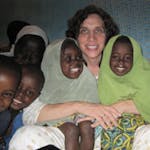I recently watched the documentary “Babies”. It’s an enthralling, wordless journey of the first year of four babies’ lives. One in Mongolia, one in Tokyo, one in San Francisco and one in Namibia in the Kalahari desert.
The contrast of approaches to food, hygiene, daily activities and medical care were obviously stark. The educational and technological divide was clear within the first five minutes of the film. And yet, I was left with universality.
The universality of smiles, of baby babble, of lullabies, of angelic moments, of sleep, of games, of exploring, of fussiness, of chubby thighs and sweet little bottoms!
Ponijao’s mother, a member of the Himba tribe in Namibia, said, “Other (tribes) have changed; only the Himba are still in the traditional culture. But I want Ponijao to decide for herself… (the filmmakers) have (given) help for Ponijao to be something in the future.”
Each set of parents wanted a global connection, a chance for learning, for themselves and their child. When I stagger under the weight of all yet to be done for mothers and babies in this world, when I reel from statistics and weep for mothers still dying in childbirth, children still dying from vaccine preventable diseases, I cling to this. We are hungry for learning and connection. And finding the spaces where universality applies and heals our divides is the starting point.
Spending an hour of my life, entranced by those darling baby bottoms and their effervescent owners, was a celebration of sameness within the paradigm of difference.
It is only when we are exposed, whether through stories and movies and music, or being able to travel, that we see our sameness, that we see our universality. Then it is a short step to compassion and to action. As parents, we are the gatekeepers of that exposure, that learning and that growth. We are they key to our children’s learning about their brothers and sisters all around the world.



 View All Blog Posts
View All Blog Posts